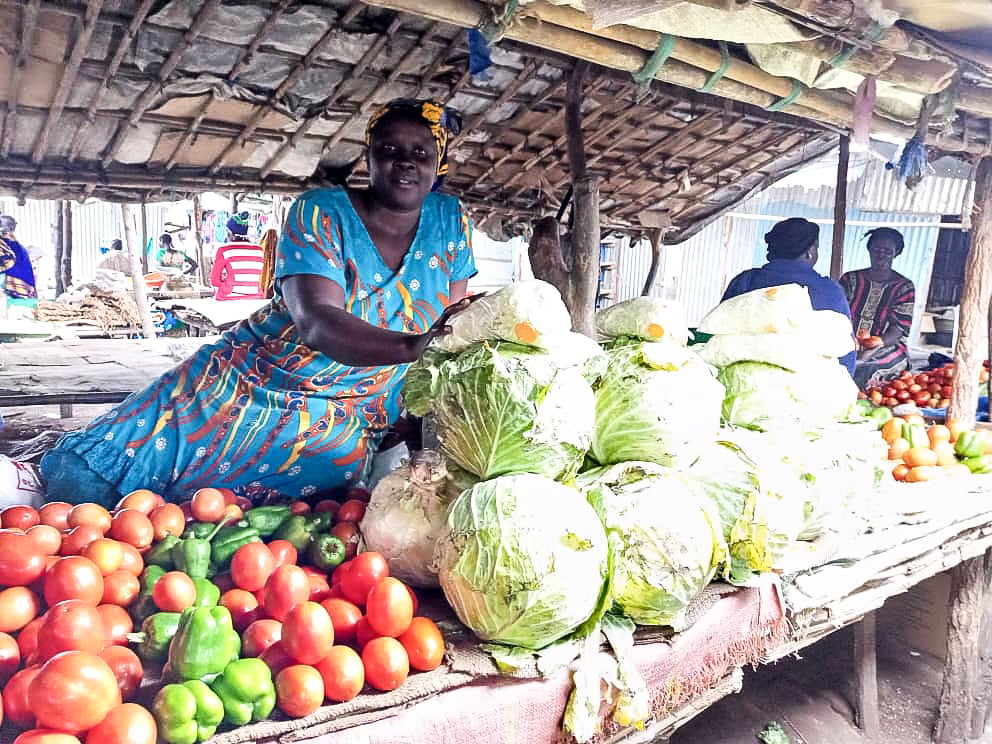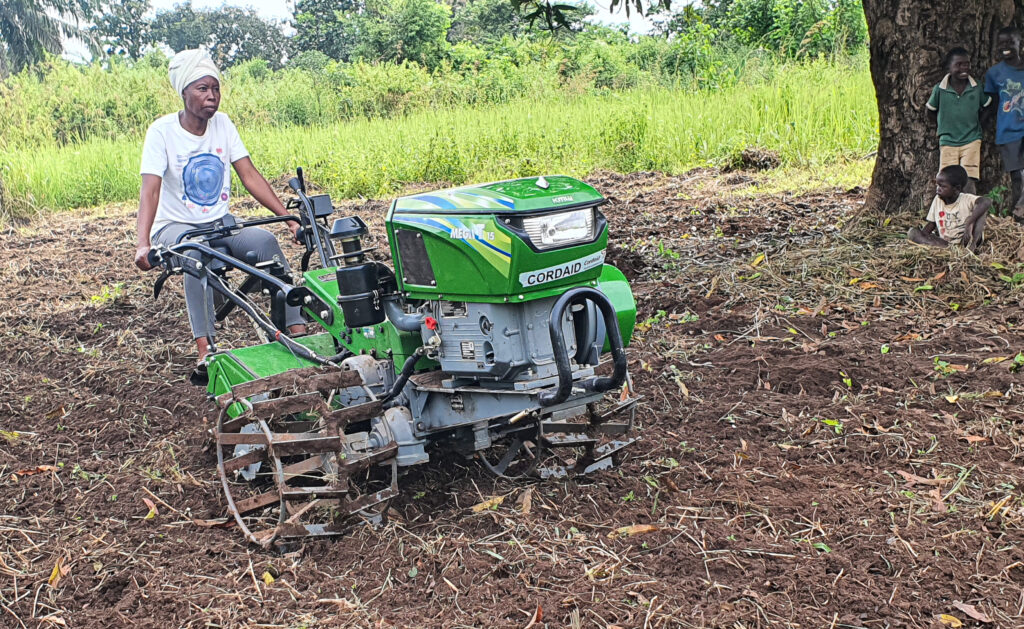“Since the start of the war in 2016, life has been difficult. And as a mother, it is always painful to see your children go to bed with empty stomachs.” For almost seven years, this South Sudanese mother, Vicky Mele, carried the burden of keeping her family alive. Today, thanks to her incredible commitment, a loan, and business skills training, she has moved beyond survival and runs a successful vegetable business.

Vicky Mele is a mother of five boys and four girls. She runs an agribusiness, growing and selling vegetables in the village of Nyong Payam, near Torit city, in South Sudan’s far south, bordering Uganda. She and other women who run small agribusinesses like her are members of a village economic market association called Hope.
“Together, we completed training courses in financial literacy and numeracy, in how to run a village saving and loan association. We received coaching in developing a business plan, keeping records, and dealing with group dynamics,” Vicky Mele explains.
Being a member of Hope, Vicky managed to receive a loan from the group’s savings to start her own vegetable retail business in Torit’s main market. “I took a loan of 200,000 South Sudanese Pounds [216 €] and this helped me start my business, while the training I received helped me to run it,” she continues. “On average, I earn a profit of 50,000 SSP a day [54 €]. With this income, I can pay the school fee of my children, buy them basic necessities, and cover their medical bills. I can also afford a more balanced diet for the family. Importantly, I feel more respected in the community.”
The overall goal of the project is to improve food security, increase income and create agribusiness job opportunities in Yambio, Torit, and Bor.
Before joining Hope and setting up her own business, hardship persisted for years. “Since the war started in 2016 life has been difficult. My husband lost his job and the burden of providing for the family was on my shoulders. Thank God for keeping us alive in those years,” says Vicky looking back.
Dutch Embassy, INGOs, and South Sudanese partners join forces
The training and support provided to Vicky and other Hope members is part of Cordaid’s project Food Security through Agribusiness Development in South Sudan (FSABSS). This five-year project (2018-2023) is funded by the Embassy of the Kingdom of the Netherlands in South Sudan. It is implemented by a consortium of three international NGOs including Cordaid (lead agency), SPARK, and Agriterra, and three South Sudanese partners including Rural Finance Initiatives (RUFI) for access to finance, South Sudan Agriculture Producers Union (SSAPU) for cooperative development and Premium Agro Consult PLC for business development services.
The overall goal of the project is to improve food security, increase income and create agribusiness job opportunities in Yambio, Torit, and Bor. In addition, the project strives to increase farmers’ and agribusiness’ (MSMEs, cooperatives, village market associations) access to organization, technology, markets, and finance.
Achievements of the project
Thus far, the project has reached 13,841 farmers working in four priority value chains, maize, sorghum, groundnuts, and cassava. 7,390 of them are women. The farmers are organized into 340 farmers’ economy and market associations and ten vegetable groups.
Through the groups, the project provided business skills and business plan development coaching and mentoring of start-ups and existing agribusinesses. A total of 62 business development advisors were trained to provide coaching and mentorship to entrepreneurs participating in the project.
As a result, 442 young entrepreneurs were scouted and trained, 180 of which were women. 597 micro small and medium enterprise owners were scouted and took a business skills training course. More than half of them were women. The project supported them in developing bankable business plans to access loans from RUFI, which has been managing the revolving loan grants. RUFI disbursed 217544 USD to 1618 borrowers of various types like cooperatives, farmers associations, and micro small, and medium enterprises. 739 of these borrowers were women.
As for Vicky, successfully starting and running her own agribusiness has had many positive implications, for her and her family. It might even take her a step further. “With the little I saved from my business, I bought a piece of land which I hope to develop and build a house on for rentals,” Vicky looks ahead.
Background
After the outbreak of violence in South Sudan in 2013, the impact of the conflict on livelihoods is still felt today. South Sudan ranks among the most fragile states in the world. The combination of national, and local conflicts and inter-communal violence account for the large-scale displacement. The consequences of the conflict include economic upheavals such as rising prices, low cereal cultivation, and horticulture which has increased incidences of food insecurity. In February 2023, an estimated 7.7 million people face acute malnutrition or starvation as the country faces its fifth year of severe food insecurity.

Affected communities resorted to the adoption of negative coping strategies such as reducing meals, going without food, or selling their last animals. This is reflected in the negative spiral of growing food consumption gaps, reduced dietary diversity, limited access to land, and reduced harvests. Fear of violence prevents farmers from cultivating new fields. Furthermore, farmers face loss of livestock, loss of assets, and limited investments in market-based employment opportunities. This in turn led to ever-deepening poverty, poor health and education, increased vulnerability, and food insecurity, reducing the population’s resilience even further.
Because of the conflict Youth and women got discouraged from farming activities. Young men are an easy target for recruitment in fighting forces or criminal groups. The continuing insecurity has resulted in increased labour of women and an increased number of female-headed households (HH), due to men’s absence or engagement in the conflict.